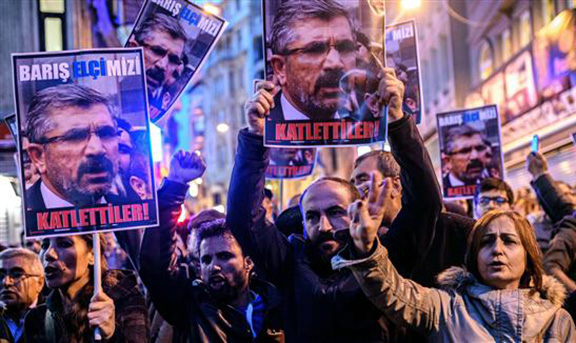
Protesters hold pictures of lawyer Tahir Elci reading “They slaughtered him!” during a demostration on Istiklal avenue in Istanbul after he was killed in Diyarbakır on November 28, 2015 (Source: AFP Photo)
ANKARA (Hurriyet Daily News)—The Peoples’ Democratic Party (HDP) has appealed to launch a parliamentary inquiry into the killing of Tahir Elci, president of the Diyarbakir Bar Association, citing similarities between events preceding Elci’s killing and those surrounding the 2007 killing of Armenian-Turkish journalist Hrant Dink.
Elci, a prominent pro-Kudish lawyer and rights activist, was shot dead by gunmen in Diyarbakir’s Sur district on November 28 following a press conference where he called for peace.
“Tahir Elci devoted his life to the struggle of finding and penalizing perpetrators and instigators of unknown murders. In that sense, he was a target for some deep structures who are known to have carried out unknown murders and who lend open support to the AKP [Justice and Development Party] rule,” Idris Baluken, HDP’s Diyarbakir parliament member and a deputy parliamentary group chair, said in his proposal filed to the parliament speaker’s office on November 30 to, “reveal the process which turned Elci into a target and which laid the ground for his slaughtering.”
Baluken explained that Elci was made a target after his controversial remarks concerning the outlawed Kurdistan Workers’ Party (PKK), which has killed dozens of Turkish soldiers since the resumption of hostilities this past summer. “The PKK [outlawed Kurdistan Workers’ Party] is not a terror organization,” Elci was quoted saying on October 14 on CNN Turk during a live interview.
“The PKK is a political movement that has important political demands and that enjoys widespread support, even if some of its actions are of a terrorist nature,” Elci said, sparking anger. His remarks then led to a one-day detainment, after which he was released pending trial. In an indictment prepared by Bakirkoy Public Prosecutor’s Office, Elci was charged with spreading terrorist propaganda. He risked up to seven years in prison if convicted. CNN Turk was also fined 70,000 Turkish Liras by Turkey’s media board, the Supreme Board of Radio and Television (RTUK), for “praising a terrorist organization.”
According to Baluken, the opening of a legal case against Elci was the government’s contribution “to the lynching regime.” He added that Elci had announced that he had received death threats as the environment of “lynching” intensified.
“Both the pool media of the political power and the circles that are close to deep structures from [the] 1990s, which are hand in glove with the ruling party, have strengthened this lynching regime day by day,” Baluken said, using the word “pool” to describe corporate owners whose media properties are at the service of the government.
“The process which ended with [the] slaughtering of Tahir Elci proceeded similarly to the process leading to the slaughtering of Armenian intellectual Hrant Dink, who was slain on January 19, 2007,” Baluken said.
In a 2006 court decision which the European Court of Human Rights (ECHR) strongly condemned as a violation of free speech, the Supreme Court of Appeals, Turkey’s highest court, upheld the conviction of Dink, a Turkish-Armenian journalist, for “insulting Turkishness” under the infamous Article 301 of the Turkish Penal Code.
Dink, who was the editor-in-chief of the bilingual weekly Agos, was shot dead outside its office building in Istanbul’s Sisli district on January 19, 2007 by 17-year-old Ogun Samast.
Dink’s conviction was related to a series of articles he wrote in 2004 in which he called on the Armenian diaspora to stop focusing on Turks and focus their attention instead on the welfare of Armenia. He also said that Armenian enmity toward the Turks “[had] a poisoning effect on [their] blood.” Dink alleged in court that this remark, which the prosecution claimed meant Turkish blood was poison, was taken out of context.
“Those who interpret my articles with such a distorted view cannot gain credit with their interpretations of historical facts or with the so-called evidence they present to explain historical facts. The way they interpret my articles also reflects the way they interpret historical facts,” Dink told Hurriyet Daily News in 2006.
Source: Asbarez
Link: HDP Seeks Inquiry into Killing of Pro-Kurdish Lawyer, Cites Similarities to Dink Murder
